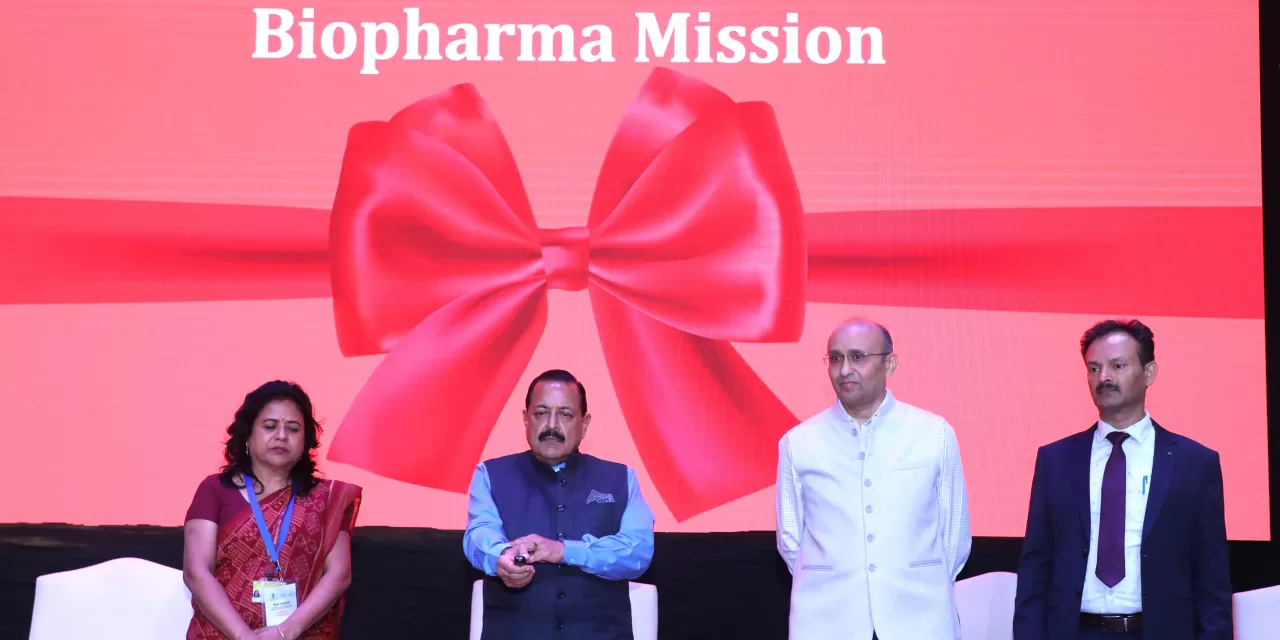New Delhi, – Union Minister Dr. Jitendra Singh emphasized that India’s bio-economy is set to lead the nation’s future growth trajectory, alongside the burgeoning space economy. Speaking at the launch of the ‘Impact Report 2024’ during the National Biopharma Mission Conclave, held at the Dr. Ambedkar International Centre, Dr. Singh underscored the significant strides made by the National Biopharma Mission (NBM) over the past five years.
The NBM, an initiative under the Department of Biotechnology, has made remarkable progress in developing India’s biopharmaceutical sector. Celebrating the Mission’s 5-year journey, Dr. Singh highlighted its achievements, including the successful launch of 18 innovative products and the support of over 200 grantees in the fields of vaccines, biotherapeutics, medical devices, and diagnostics.
“India’s bio-economy has seen exponential growth, expanding 13-fold in the last decade, from $10 billion in 2014 to over $130 billion in 2024. This growth trajectory is projected to reach $300 billion by 2030,” stated Dr. Singh. He noted that India’s rise from 81st to 40th in the Global Innovation Index since 2015 is a testament to the nation’s increasing innovation capacity, much of which is driven by initiatives like the NBM.
Dr. Singh attributed this success to the collaborative efforts between industry and academia under the National Biopharma Mission – Innovate in India (I3). The Mission, co-funded by the World Bank, was launched with a budget of $250 million, and now benefits nearly 150 organizations and 300 MSMEs. The Minister remarked, “The NBM has transformed India’s biopharma sector into a globally competitive industry, addressing critical unmet medical needs.”
One of the Mission’s standout contributions includes India’s first DNA vaccine for COVID-19, ZyCoV-D, and the country’s first MRI scanner. It has also introduced India’s first Injectable Non-Insulin Antihyperglycemic Biosimilar for Type 2 diabetes (liraglutide). These innovations, along with 21 shared infrastructure facilities established for research services and biomanufacturing, have significantly bolstered India’s healthcare capabilities.
Dr. Singh also pointed out that these shared facilities played a crucial role in COVID-19 vaccine trials, saving both time and costs. As India advances towards its 2047 goals, these infrastructures are expected to be key assets in the nation’s healthcare landscape.
In addition to product development, the NBM has made strides in intellectual property management, establishing seven technology transfer offices nationwide and organizing over 450 IP rights awareness campaigns. More than 25 technologies have been licensed to industry, generating substantial revenue and further solidifying India’s biopharma sector’s global standing.
The Minister lauded the Mission as a “game changer,” emphasizing its role in making India a leader in preventive healthcare. He credited Prime Minister Narendra Modi’s vision for empowering the Department of Biotechnology and BIRAC (Biotechnology Industry Research Assistance Council) to strengthen India’s healthcare ecosystem. “India is now recognized as a frontline nation in preventive healthcare, with the bio-pharma sector playing a pivotal role,” Dr. Singh asserted.
Dr. Singh concluded by stressing the importance of early industry linkage and breaking the stereotype that startups are only about IT. He urged startups to seek broader opportunities, leveraging the robust support from government and industry alike. He also highlighted the Genome India Flagship Programme, which aims to sequence 10,000 genomes and is expected to shape future healthcare strategies globally.
The event marked a significant milestone in India’s journey towards becoming a global leader in biopharmaceuticals, with the National Biopharma Mission at the helm of this transformative journey.











